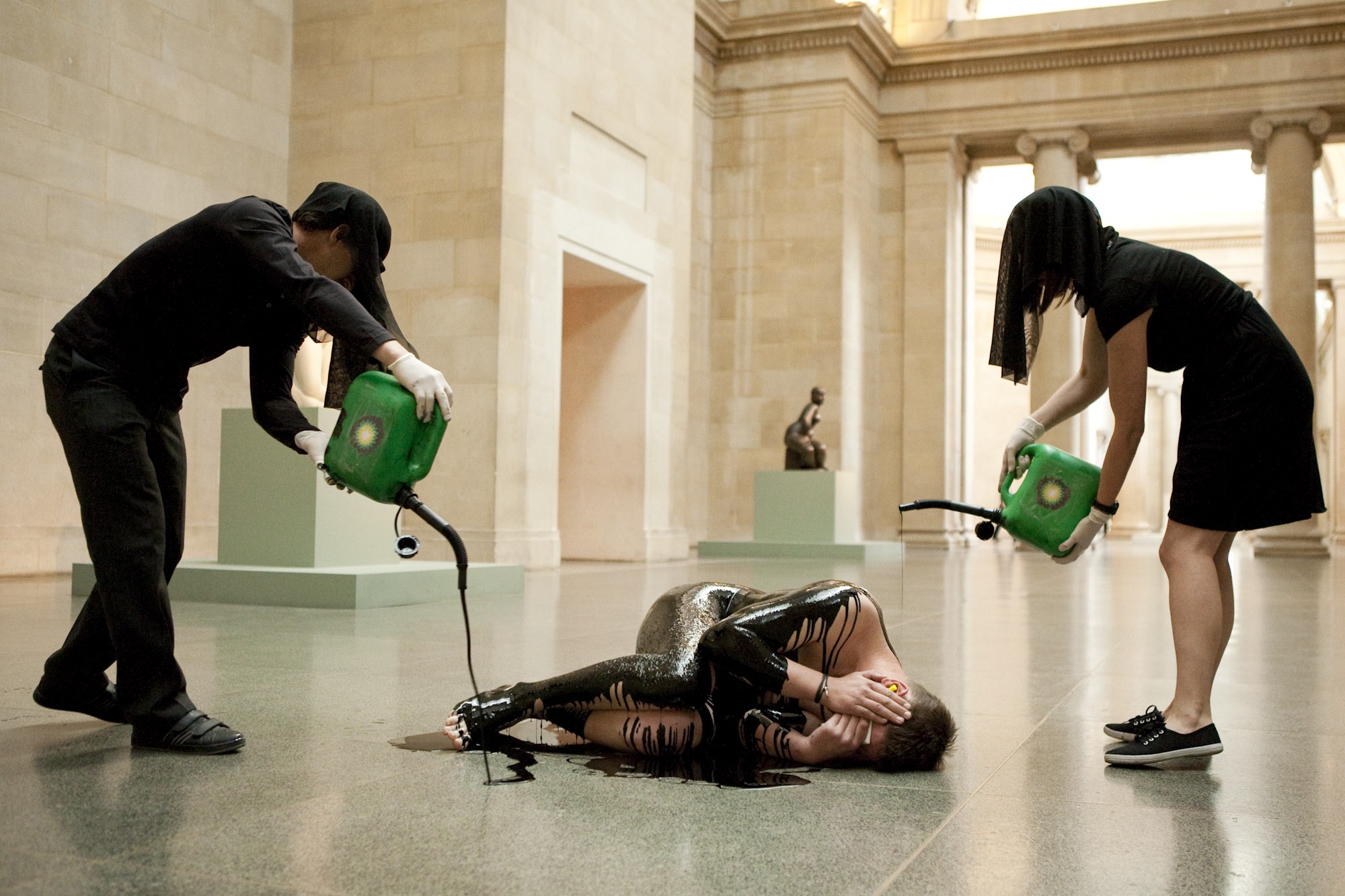
BP's sponsorship of Tate attracted protests before it ended this year
Photo: Liberate Tate (2011). Photo by Amy Scaife
Why your organisational values should inform your fundraising
Fundraising in the arts has never been more highly regulated, but that doesn’t mean organisations should forget their own ethics and values, argues Michelle Wright.
The increasing number of responsibilities for trustees and leaders of arts organisations can seem overwhelming, and when things go wrong the Government’s response is to regulate or legislate. That’s why we have rightly seen the creation of a new Fundraising Regulator to help protect the public’s trust in fundraising and to overcome the difficulties that we’ve seen in recent months in relation to poor fundraising practice and tactics.
If we want our arts organisations to be trusted and excellent, then surely it’s our values that help inform how we go about our fundraising in an ethical manner
However, when we know that great art needs to both experiment and take risks to achieve excellence, how on earth can we balance the complexities of ensuring freedom of artistic expression with the increasing responsibilities to comply?
Vision, mission and values
When we think about organisational purpose, we need to go back to first principles and continually reassess our vision and mission. After all, it’s these statements that determine our core purpose. It’s a fundamental responsibility of trustees to ascertain whether their organisation is fulfilling the needs and objectives that it was set up to address.
Linked to the vision and mission are organisational values. In the most basic interpretation, values are what matter to us. They are what motivates our behaviour and they ground our judgement about what is good or bad, desirable or undesirable.
As I think of the new fundraising regulations, I increasingly believe that focusing on core organisational values can be helpful. If we want our arts organisations to be trusted and excellent, then surely it’s our values that help inform how we go about our fundraising in an ethical manner. Fundraising is ethical when it protects rather than damages public trust. It’s ethical when the relationship is two-way between donor and organisation. It’s ethical when it brings meaning or increases the value of the art. It needs to benefit and empower rather than destroy.
In an ideal world it is our values that should guide how we act, not the stick of regulation and compliance. If we know exactly where the red lines are in relation to what is and isn’t acceptable for individual organisations, it becomes easier to determine what funding we should avoid or accept, what we should purchase or not.
Defensible and pragmatic fundraising
This isn’t an easy thing to do. Getting an organisation comfortable with its own values is one of the hardest things that trustees and executives can achieve. But it is at the heart of effective funding relationships.
Corporate sponsorship isn’t philanthropy – it’s a business exchange. Trustees need to therefore decide whether taking on a sponsor will not only further an organisation’s artistic cause, but also whether the association can genuinely stand up against core values. Its position must be defensible.
There is no black or white in questions of ethics, but a sense of solidarity with others can be helpful. The position is clearer for firms where legitimacy seems to be a problem, such as sponsors causing environmental damage or those adopting unethical recruitment practices.
Many arts organisations have signed up to the Fossil Fuel Free campaign, publicly pledging to not accept money from related companies. Undoubtedly this approach is right for some, but as a pragmatist and someone who supports organisations to raise funds and develop resilient business models, I think that if we start to close doors and pick and choose too often, we run the risk of making it difficult for sponsors to enter into a relationship with the arts. And that could significantly hurt our cause.
Ethical guidelines
There is no debate in the arts that I know of that polarises opinion more, but this is exactly why values are so important. The drafting of a straightforward set of ethical guidelines is a key governance responsibility and a board that is well run will have actively engaged in the ethical debate and will continue to return to the issue as its activities and practices change.
If trustees focus on what really matters to their specific organisation, they can more easily support their leaders to take considered risks. In this scenario, the position about from where to accept funding becomes both understandable and defensible.
As regulatory responsibilities increase for trustees, we simply can’t put ethical fundraising on the ‘too difficult’ pile. If we know what we stand for, then we increase our fundraising potential rather than become too scared to act.
Michelle Wright is the Founder and CEO of fundraising and development enterprise Cause4 and is Programme Director of the Arts Fundraising & Philanthropy Programme.
artsfundraising.org.uk
Tw @artsfundraising
This article is part of a series of articles on the theme Fundraising for the future, sponsored and contributed by Arts Fundraising & Philanthropy.
Arts Fundraising & Philanthropy is about to embark on a series of training days in partnership with Index on Censorship and What Next?, funded by Arts Council England, to explore how the changes in regulation and the political climate affects the choices about the artistic work that we want to create or produce. Contact [email protected] for further information.
Join the Discussion
You must be logged in to post a comment.